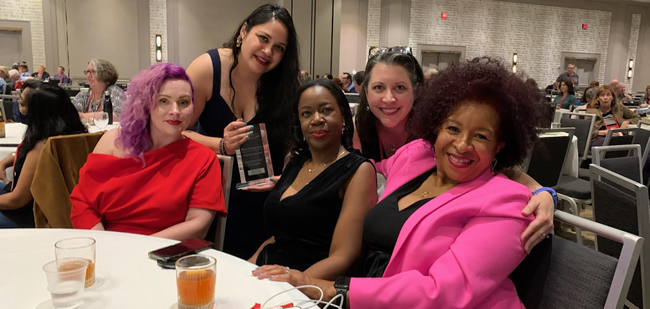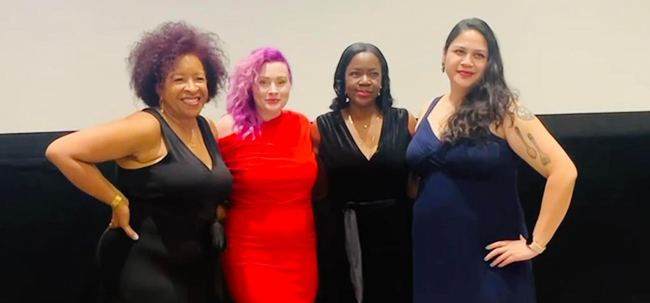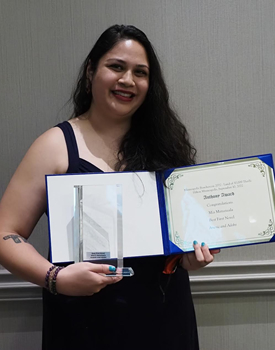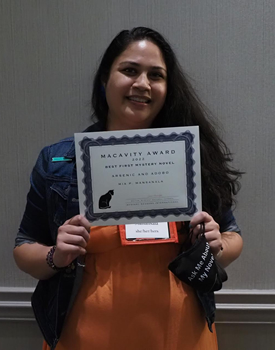

Latest Books On the Cover: Mia P. Manansala
New-Style Culinary Cozy Mysteries Come with Content Warnings
 By Joanna Elm
By Joanna Elm
She should have seen it coming. Yet, when Mia P. Manansala heard her name announced as the winner of the Macavity Award in the Best First Novel category at last month’s Bouchercon, she was shocked. This, despite her debut novel landing on more than a half-dozen “most anticipated” book lists of 2021; despite starred reviews in Publishers Weekly, Library Journal, and Booklist, and despite having received the 2021 Agatha Award for Best First Novel from Malice Domestic.
Manansala—whose protagonist, a Filipina American like herself, is the amateur sleuth of her culinary cozy mysteries—says, “Bouchercon isn’t known for giving awards to cozies, so I literally cursed out loud when I heard my name because I hadn’t prepared a speech.”
Mercifully, she adds, she noticed that winners in other categories were keeping their speeches short. She had to go through the whole routine again when, later during the conference, she was announced the winner of the Anthony Award for Arsenic and Adobo, again in the Best First Novel category.
With a trifecta of major awards under her belt, Manansala spoke to The Big Thrill on the eve of publication of BLACKMAIL AND BIBINGKA, the third cozy in the Tita Rosie’s Kitchen Mystery series.
As in the previous two titles, the third features Lila Macapagal, a Filipina millennial, as the protagonist who returns from the big city to her small hometown after breaking up with her cheating boyfriend. Vowing to stay only for so long as she is needed by her Tita Rosie to help with her failing restaurant, Lila is still in Shady Palms when we enter Book 3.
Manansala continues to combine Lila’s love for food with a talent for solving darker mysteries, swirling around her expanding family and circle of friends.
BLACKMAIL AND BIBINGKA opens with disquieting news for Lila. Her long-lost cousin Ronnie (Tita Rosie’s son) has returned to Shady Palms —just in time for Christmas—as owner of the local winery.
Ronnie has a troubling past, and it isn’t long before one of the investors in his winery keels over and dies after a champagne celebration. What at first appears to be alcohol poisoning, turns out to be murder. Ronnie becomes the chief suspect.
With the help of her sidekicks, Adeena and Elena, and under the watchful eye of her three matchmaking godmothers as well as her grandmother Lola Flor, Lila has to divert her attention from her new business, the Brew-ha Cafe, to help her wayward cousin. But proving his innocence is an uphill battle as secrets of Ronnie’s involvement with shady characters come tumbling out—and become fodder for a blackmailer.

Manansala displays her Anthony Award for Best First Novel with panel moderator Heather Ash and fellow nominees Heather Levy, Yasmin Angoe, and Wanda M. Morris.
The secrets are not of the light, fluffy variety, either. In her Author’s Note at the start of the book, Manansala warns of potentially triggering content: “Substance abuse, gambling addiction, infidelity, emotional abuse, police corruption, family abandonment, physical violence, mentions of suicide.”
Manansala posted similar content warnings in her first two books. In Arsenic and Adobo, the content warning includes issues of drug abuse, racism, and domestic violence. In the second, Homicide and Halo-Halo, it includes issues of PTSD, fat phobia, and dismissive attitudes toward mental health.
She prides herself on “leaning into the trope” of a millennial cozy (“a rom-com with dead bodies”) while at the same time breaking the mold.
“Usually cozies are light and fluffy because they’re meant to be escapes,” she says. “Not many cozies touch on heavy social issues. For example, in Book 2 Lila experiences PTSD (post traumatic stress disorder) following the events of Arsenic and Adobo.
“I have yet to see a cozy in which the protagonist, an ordinary citizen, deals with the effects of getting involved in a murder investigation. But it’s definitely right for my character, Lila, and in the second book I touch on this.
“So, I have content warnings in my Author’s Notes because the book covers make them look like a fun read, but then it deals with issues like PTSD.”
This is consistent with the new-style cozy mystery that features millennial amateur sleuths from diverse ethnic backgrounds.
“Millennial cozies are not a separate category just because they’re aimed at that age group, but they’re also about voice and particular concerns,” Manansala says. “The concerns of millennials are different to the concerns their parents had at the same age.”
It’s a new market to which publishers have recently started appealing. Less than four years ago, Manansala’s first book, so far unpublished, with a Filipina protagonist, was out on submission and got to the acquisition stage with three editors who were then told by their sales teams that traditional mystery readers are older White women who are not going to read a book featuring a Filipina millennial protagonist.
Nevertheless, while the first book was making the rounds, Manansala was writing Arsenic and Adobo, her first culinary cozy in the Kitchen Mystery series. She was writing in a subgenre, which she loved to buddy-read with her mother. “It was a great way to distract myself; to play in this new world.”
In the meantime, Manansala explains, publishers’ views caught up with readers’ views and they realized that in concentrating only on an audience of older White women, they were missing out.
Her agent, Jill Marsal, took Arsenic to auction and landed Manansala a three-book deal in 2020. Her debut was published in May 2021, Homicide and Hal-Halo followed in February 2022, and Book 3, BLACKMAIL AND BIBINGKA, is now available.

Manansala poses with Wanda M. Morris, Heather Levy, and Yasmin Angoe before the Anthony Award ceremony at Bouchercon 2022, where they were all nominated for Best First Novel.
“Obviously you have to write a good book, but I’m not going to downplay luck and timing,” Manansala says. “I happened to write Arsenic and Adobo when Berkley was specifically seeking out exactly the book I wrote. They said, ‘Your book is essentially what we started the millennial cozy line for.’ Berkley realized that cozies are not just this one thing (for older White women.)”
In April, Manansala signed a contract for another three books in the Tita Rosie’s Kitchen Mystery series in what Publishers Marketplace described as a “good deal.” So, yes, earlier this year, Manansala quit her part-time library day job after discussing it with her husband. “I want to write more, and we decided I’m young enough to give full-time writing a try; we have no kids and my husband has a stable job with good benefits. Now is the time for giving my all to one thing,” she says.
Manansala has already turned in the manuscript for Book 4, Murder and Mamon, but says, “I’m not a fast writer for this genre, but I’ll get faster and get a more disciplined routine. The culinary cozies are not the only books I want to write. I can see maybe writing 10. Don’t know about 30.”
One of the first things she promises herself is to get organized with a character bible so she can keep up with the arcs and timelines, especially of her secondary characters who have lives separate from Lila’s. “It’s difficult to keep up when I’m promoting one book, drafting another, revising a third…”

Manansala celebrates winning two awards at this year’s recent Bouchercon conference. Photo credit: John Bychowski
Oh, and then there’s research. For an author who appears to exemplify the write-what-you-know principle, Manansala is a surprisingly fastidious researcher, to the extent of hiring a homeland sensitivity reader. She explains that, even though she was raised in a Filipino family, she didn’t grow up in a Filipino community. She needed someone to fill in the gaps for her and provide nuance.
“I understand the language and I know vaguely about the culture, but I might use a Filipino word and the reader will say, okay that’s the right meaning of the word, but it’s not one we would use in conversation,” she says. “You don’t want it to sound like a Google translation!”
She also researches the recipes in her books. She aims to include about four in each installment.
What about the name, Shady Palms? Did she research the name of the town? Is there a real-life Shady Palms?
“I didn’t want the town to actually exist in real life,” Manansala says, adding that she tried all sorts of combinations with Shady—for example, Shady Grove—but discovered they all existed. So, she created Shady Palms as a placeholder. When it survived the revisions process, she created a reason for the name and went back to insert the rather imaginative explanation into her first book: One of the town’s founders was a Jamaican man who imported palm trees into the town. When they all died, he replaced them with fake palms along Main Street.
Manansala has come a long way since her decision in 2015 to write a book. She credits fellow author Lori Rader-Day and author-mentor Kellye Garrett for steering her in the right direction, and a how-to book, Story Genius by Lisa Cron. Specifically, she mentions two workshops taught by Rader-Day.
“I’ve read mysteries all my life, and so I intuitively understood story and the three-act structure, but I understand the process a little better now,” she says. “In the beginning I didn’t know outlining was a possibility. Now I’m thinking more critically and analytically. When I’m doing revisions, I’m more thoughtful now that it’s a job.”
One element she really pays attention to while revising is her chapter endings. BLACKMAIL AND BIBINGKA is a real page-turner.
“It feels like it comes naturally,” Manansala says. “But I pay a lot of attention to those chapter endings during revisions. Oh, and I keep my chapters short.”
- Up Close: R.G. Belsky - October 31, 2022
- On the Cover: Mia P. Manansala - September 30, 2022


